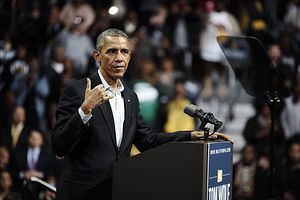American foreign policy demands teamwork between the two parties. Yet, despite consecutive electoral victories more definitive than his predecessor’s, many Republicans shunned President Barack Obama as an illegitimate alien. They often equate compromise with apostasy. Even if Obama had been endowed with the charm of an FDR or Ronald Reagan, he could never have swayed those who cringe at the sight of a Marxist Muslim Kenyan in the Oval Office.
But, as Harry Truman said, “the buck stops here” and, as he approaches the end of his second term, it is fair to judge Obama’s performance in foreign affairs.
First, there is China, which, despite the efforts of Russian President Vladmir Putin, remains the major threat to U.S. interests.
Like George W. Bush, Obama has tolerated Chinese provocations (Bush kowtowed when a Chinese air force pilot’s antics almost killed the crew of a U.S. Navy EP-3, whom China then captured as quasi-POWs). The relatively calm U.S. response to Chinese predatory practices has allowed Washington to build an anti-PRC coalition. A broad alliance against Beijing only works if regional actors are convinced that the U.S. is not on the warpath but do see America as essential to shield them from China. By withdrawing most U.S. forces from Iraq and Afghanistan, Obama increased the resources available to deter the People’s Republic or North Korea.
It also appears that the Obama administration helped Tokyo and Seoul to reach a sort of truce over Imperial Japan’s role in enrolling Koreans into sexual slavery (the “comfort women”). The statement of Japanese Prime Minister Shinzo Abe, though not on par with German apologies, has partially defused a situation that was making it hard for the two U.S. allies to work together. Improving Japan-South Korea relations strengthens the anti-China coalition.
Then, there is Southwest Asia. Here, only millions of U.S. soldiers supported by first-rate militaries such as NATO states, Japan, Korea, and Australia rather than unreliable local allies, engaging in a multi-generational pacification campaign, could achieve real results here. But even hawks don’t have the stomach for Roman-style conquest. At the same time, Americans, from hard-right fans of carpet-bombing to liberal interventionists, can’t come to terms with (relative) U.S. powerlessness.
Obama has scaled back American manpower in Afghanistan and Iraq and has, so far, avoided a massive return of U.S. ground units to the region. His Libyan and Syrian policies suggest that he too fell into the trap of not understanding that tyrants can be better than anarchy. However, these regimes were so fragile that civil war was perhaps unavoidable. Some criticized Obama for letting Mubarak fall, as if the United States controlled the fate of a nation of 90 million inhabitants.
The Iran deal will not stop the ayatollahs from their nefarious activities but U.S. partners Saudi Arabia, Israel, Kurdistan, and Turkey also have goals that conflict with American ones. Logic dictates that the U.S. engage everybody. In some cases, the U.S. and Iran are sworn enemies. In others, such as the struggle against Saudi-inspired Sunni jihadism, Tehran and Washington are on the same side. Establishing a relationship with Iran is also an insurance policy should the House of Saud be overthrown.
Obama failed to make any headway on the Israeli-Palestinian front. But given the pathetic behavior of all parties and the Congressional infatuation with Israeli Prime Minister Benjamin Netanyahu, it might have been hopeless from the start.
By the end of his second term, Obama may close down Guantanamo. This prison has only served to provide fodder to American enemies, its demise is good news for the United States.
Unlike George W. Bush, Barak Obama never said of the retired KGB officer who runs Russia “I found him to be very straight forward and trustworthy and we had a very good dialogue. I was able to get a sense of his soul.” The U.S. was taken to task for a feckless response to the invasion of Ukraine. But Ukrainians themselves failed to establish a functioning state. Under these conditions, it is hard for America to help, especially in the absence of more than token Western European support. Ukraine is not the best locale to confront Russia. Anyway, it may turn out to be more of a quagmire for Moscow than Putin realizes.
This brings us to another challenge – one that Obama himself alluded to in a recent interview. Since the Berlin Wall fell, the other NATO states have eviscerated their militaries with the enthusiasm Jack the Ripper deployed on his helpless victims. France and Britain, with a combined GDP of $5.7 trillion and 130 million citizens, couldn’t take out the Libyan chieftain (GDP $0.04 trillion, seven million inhabitants) on their own. Other European allies, starting with Germany, are farther down the road to unilateral disarmament. On the other side of Eurasia, Japan continues to punch below its weight, mired in obtuse debates about the use of force.
These problems are not new but they have increased since the end of Cold War, when NATO-Europe accounted for a larger percentage of total allied capabilities. The United States finds itself more and more alone whenever it tries to gather up a posse to handle a crisis or simply to deter enemies.
In Latin America, normalization with Cuba will give the U.S. a stronger foothold there. It enhances its influence if and when the regime transforms itself or collapses.
Unlike China, the United States is an ideological power. As such it needs to inspire people all over the world. Obama turned out not to be the Messiah, but America’s brand has regained some of its luster under his presidency.
Like the early Weimar Republic, Obama served as the undertaker of a failed ruler’s legacy. Such jobs are always thankless. Despite Republican rejectionism, Obama’s results are impressive.
Robert Dujarric is Director, Institute of Contemporary Asian Studies, Temple University Japan ([email protected]).

































